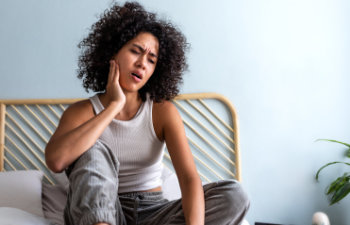
Sleep bruxism, commonly known as teeth grinding, is a sleep disorder that affects many individuals. It involves the unconscious grinding, clenching, or gnashing of teeth during sleep, leading to a range of dental and health issues. At Northern Virginia Sleep Solutions, we understand the impact of sleep bruxism on your well-being. In this blog post, we will explore the causes of sleep bruxism and provide insights into potential solutions to help you find relief.
Top Causes of Sleep Bruxism
While the exact cause of sleep bruxism is not fully understood, several factors can contribute to its development. These causes can vary from person to person, and it is often a combination of multiple factors. Here are some common contributors to sleep bruxism:
- Stress and Anxiety: Emotional stress, anxiety, or tension are often associated with teeth grinding during sleep. The subconscious grinding may be a manifestation of the body’s response to stress.
- Sleep Disorders: Sleep bruxism can be linked to other sleep disorders, such as sleep apnea or snoring. Disrupted sleep patterns or abnormal breathing during sleep can trigger teeth grinding.
- Malocclusion: Misaligned teeth or an abnormal bite, known as malocclusion, can contribute to sleep bruxism. The grinding may occur as the body’s attempt to adjust the bite and find a more comfortable position.
- Medications and Substances: Certain medications, such as antidepressants or stimulants, can increase the likelihood of teeth grinding. Additionally, the use of tobacco, alcohol, or caffeine may exacerbate the condition.
- Lifestyle Factors: Poor lifestyle habits, such as excessive alcohol consumption, smoking, or high caffeine intake, can contribute to sleep bruxism. These habits may disrupt sleep patterns and increase muscle tension.
Solutions for Sleep Bruxism
Managing sleep bruxism involves addressing the underlying causes and providing relief for symptoms. Here are some potential solutions that can help alleviate the effects of sleep bruxism:
- Stress Management: Adopting stress-reducing techniques, such as exercise, meditation, or counseling, can help manage teeth grinding associated with stress and anxiety.
- Oral Appliances: Our team can provide custom-made oral appliances, such as nightguards or splints, to protect teeth from the effects of grinding. These appliances create a barrier between the upper and lower teeth, reducing the impact of clenching and grinding.
- Sleep Hygiene: Maintaining good sleep hygiene practices, such as establishing a consistent sleep schedule and creating a relaxing sleep environment, can improve overall sleep quality and potentially reduce teeth grinding.
- Lifestyle Modifications: Avoiding substances like tobacco, alcohol, and excessive caffeine can help minimize the occurrence of sleep bruxism. Making healthy lifestyle choices can contribute to better sleep and reduced grinding.
- Treatment of Underlying Sleep Disorders: If sleep bruxism is associated with sleep apnea or other sleep disorders, treating the underlying condition may help alleviate teeth grinding. Consultation with a sleep specialist at Northern Virginia Sleep Solutions can provide guidance on appropriate treatment options.
Contact a Teeth Grinding Specialist in Alexandria
Sleep bruxism can have detrimental effects on your dental health and overall well-being. Understanding the causes of this sleep disorder is crucial in finding effective solutions. At Northern Virginia Sleep Solutions, we offer comprehensive evaluations and personalized treatment plans to address sleep bruxism. Don’t let teeth grinding disrupt your sleep and oral health. Seek professional help to identify the underlying causes and explore appropriate interventions for a better night’s rest.
Posted on behalf of
1725 Duke St, Suite GR03
Alexandria, VA 22314
Phone: (571) 290-7977
nvsleepsolutions@gmail.com
Monday, Friday 8:00 AM – 3:00 PM
Tuesday - Thursday 7:00 AM – 5:00 PM